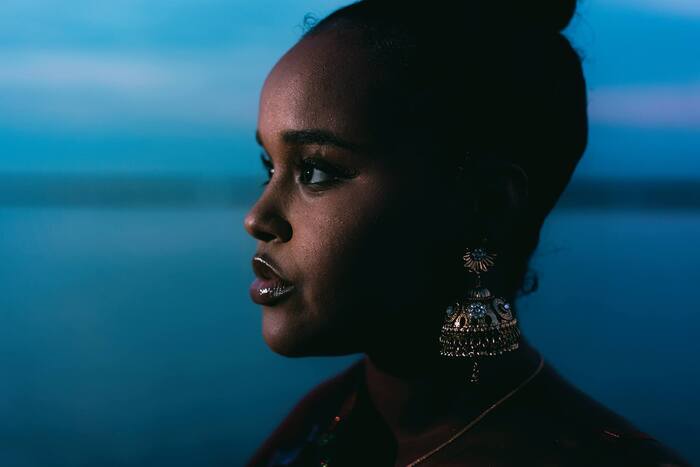Purveyors of: Smooth beats saturated with the R&B instrumentals you’ve always wanted.
File next to: Kaytranada, Tycho
Playing: WL18 Night 1, Friday, Feb. 16 @ The Garrison. Get tickets here!
OBUXUM is a Somali-Canadian musician whose most recent release, H.E.R., tells her story through her love for creating her own beats. She has garnered attention from playing at Kazoo! Fest, Electric Eclectics, Venus Festival, Big On Bloor, and more. Wavelength’s Emily Scherzinger talked to her about the “pure bliss” of translating her emotions into music, her inspirational mother, and more.
I love the Eartha Kitt sample at the end of “He(r)story.” What does compromise mean to you?
When I initially heard that interview, numerous thoughts ran through my mind… I couldn’t help but put it in context in regard to my music. My sound is different, weird, but most importantly, me. There were times when I had doubts, like thoughts would come to my head if I should music that sounds popular. I struggled with that for awhile, and thought to myself that I should never compromise my sound for anything or anyone. It represents the stories and moods that I am in while creating. It reminds me to ignore everything and everyone and just do me. That’s what I wanted to tell.
On that note, your latest album seems quite personal and intense. How is H.E.R. an experience in self-exploration?
2017 was a crazy year for me. For the first time ever, I was getting non-stop bookings for my beats. It was a dream come true for me. When I started performing live, I connected so much with the crowd. It informed the way I currently create music. […] I was going through a ton of personal stuff, and […] H.E.R. allowed me to navigate these areas. It allowed me to create stories from my perspective, stories that I wanted to share, feelings and raw emotion that I wanted the crowd to connect to on a personal level, you feel me?
On your Bandcamp you wrote, “the blk, brwn, and indigenous womxn have inspired me endlessly to remain courageous, daring and bold.” Are there any specific womxn that you would point young people towards for inspiration, musically inclined or otherwise?
My mother is first and foremost my biggest inspiration. She embodies H.E.R. I wanted to focus on the women in Toronto, because there were several womxn invested in me, and made sure I got to play live. They inspired me to be bold, daring, and courageous. Shout out to Witch Prophet and Pursuit Grooves, who are both incredible musicians doing beautiful things in the city.
It’s almost impossible to select a “favourite” track off the album, since all of your tracks are incredible! But, if I had to choose, I would pick “DUNKIN VIBRATIONS.” Can you tell me a little bit more about that track?
Aw! I’m so happy to hear that. I love “DUNKIN VIBRATIONS,” too. It was the first track I made for the project. After talking to my partner, who is also an incredible producer, I opened up my laptop in pure bliss and wanted to translate how I was feeling. The melody came first to me, and everything else followed. I wanted to create a full track, with colour to it. After I made the track, I named it “DUNKIN VIBRATIONS” because I saw and felt colourful.
How do you see your work has moved, grown, and changed, from 2991, in May 2015, to H.E.R., in November 2017?
With 2991, it was a beginner project. At the time, I was very hip-hop-focused and driven. I sampled a whole bunch of early rock and alternative music. I also interviewed my mentors at the time, and that still holds value to me to this day. I came up with the series The Metaphor, which includes Luul, Itiyama, and H.E.R. I wanted the series to focus on my self-exploration, my growth, and my love for music, all the while being a Somali-Canadian womxn maneuvering through this industry. I wanted each project to get better, and more full and more me, in a sense.
Finally, can you speak about your experience as a woman of colour in the music production world?
My experience has been rewarding for the most part. There are still things that I would like to see change at times — other male performers would be shitty towards me — but it’s rare that happens. The love that I have been receiving overshadows all of the negativity, and I also know my purpose, so I make sure that, every time I perform, I give the crowd my heart and soul and return, so that they can connect with me on more of a spiritual level.
— interview by Emily Scherzinger

